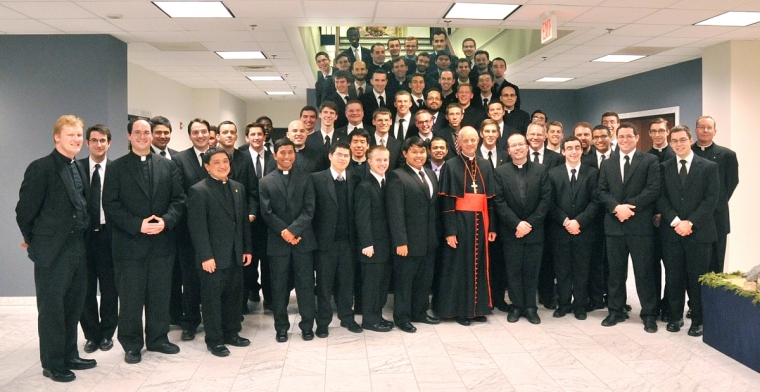Washington Archdiocese Praises House for Upholding Religious Freedom in U.S. Capital

The Archdiocese of Washington, led by Cardinal Donald Wuerl, the Archbishop of Washington, has commended the House of Representatives for thumbing down last week two laws which religious and pro-life groups in Washington D.C. say infringe on their religious liberty.
The archdiocese led the opposition to the laws, which were disapproved by the House through the passage of H.J. Res. 43, deemed as the first step toward undoing them, the Catholic News Agency reported on Friday.
One of the two laws is the Reproductive Health Non-Discrimination Amendment Act, which would outlaw hiring or firing of employees for their reproductive health choices even if those choices are against the mission of their employer like a pro-life group or a Catholic school. For example, employers would have to retain employees who had an abortion with public knowledge of the matter.
The other law is the Human Rights Amendment of 2014, which would reverse a 25-year-old revision providing a conscience exemption to schools affiliated with a religion so they would not have to recognize groups or persons acting in public opposition to their mission. Under this, Catholic schools would not have to let pro-gay events use their facilities or to officially recognize openly-gay student organizations.
"The archdiocese is very grateful to the members of the U.S. House who voted for H.J. Res. 43 and for the coalition partners who have rallied to uphold religious freedom in our nation's capital," the archdiocese said in a statement.
The two laws, approved by the Washington, D.C. city council in December and signed by Mayor Muriel Bowser (D) into law in January, were seen in violation of the First Amendment rights.
"Despite having advocated for our constitutional rights with the District of Columbia Council throughout the legislative process, both [Reproductive Health Non-Discrimination Amendment Act] and [Human Rights Amendment Act] were passed and the D.C. Council transmitted these two measures to the U.S. Congress on March 6, initiating a thirty-legislative-day congressional review period," the archdiocese said.
"The archdiocese's appeal to the U.S. Congress to pass resolutions of disapproval to restore these constitutional rights was the only legislative recourse that remained," it added.
The House vote was divided largely between parties, with most Republicans voting for the passage of the measure while almost all Democrats voted against it.
Rep. Diane Black (R-Tenn.) lauded the House for upholding religious freedom after the resolution's passage.
"At its core, the Reproductive Health Non-discrimination Act is perhaps the most discriminatory 'non-discrimination' law we have seen to date," she said in a statement.
"While this particular law only applies to the District of Columbia, it sets a dangerous precedent for future legislation that could further weaken our long-held tradition of respecting Americans' conscience rights," she added.
The joint resolution, however, also has to be approved by the Senate and signed by President Obama. The White House, however, already announced on April 30 that it will veto the measure.
Once a bill become law in the city, Congress only has 30 days to pass a joint resolution disapproving it. The one-month window was expected to end on April's last day for the House, but for the Senate it could end on May 4 since it did not receive the laws until March 10.
 Christians don't have to affirm transgenderism, but they can’t express that view at work: tribunal
Christians don't have to affirm transgenderism, but they can’t express that view at work: tribunal Archaeology discovery: Medieval Christian prayer beads found on Holy Island
Archaeology discovery: Medieval Christian prayer beads found on Holy Island Presbyterian Church in America votes to leave National Association of Evangelicals
Presbyterian Church in America votes to leave National Association of Evangelicals Over 50 killed in 'vile and satanic' attack at Nigerian church on Pentecost Sunday
Over 50 killed in 'vile and satanic' attack at Nigerian church on Pentecost Sunday Ukrainian Orthodox Church severs ties with Moscow over Patriarch Kirill's support for Putin's war
Ukrainian Orthodox Church severs ties with Moscow over Patriarch Kirill's support for Putin's war Islamic State kills 20 Nigerian Christians as revenge for US airstrike
Islamic State kills 20 Nigerian Christians as revenge for US airstrike Man who served 33 years in prison for murder leads inmates to Christ
Man who served 33 years in prison for murder leads inmates to Christ


 Nigerian student beaten to death, body burned over ‘blasphemous’ WhatsApp message
Nigerian student beaten to death, body burned over ‘blasphemous’ WhatsApp message 'A new low': World reacts after Hong Kong arrests 90-year-old Cardinal Joseph Zen
'A new low': World reacts after Hong Kong arrests 90-year-old Cardinal Joseph Zen Iran sentences Christian man to 10 years in prison for hosting house church worship gathering
Iran sentences Christian man to 10 years in prison for hosting house church worship gathering French Guyana: Pastor shot dead, church set on fire after meeting delegation of Evangelicals
French Guyana: Pastor shot dead, church set on fire after meeting delegation of Evangelicals ‘Talking Jesus’ report finds only 6% of UK adults identify as practicing Christians
‘Talking Jesus’ report finds only 6% of UK adults identify as practicing Christians Mission Eurasia ministry center blown up in Ukraine, hundreds of Bibles destroyed: 'God will provide'
Mission Eurasia ministry center blown up in Ukraine, hundreds of Bibles destroyed: 'God will provide' Church holds service for first time after ISIS desecrated it 8 years ago
Church holds service for first time after ISIS desecrated it 8 years ago Burger King apologizes for 'offensive campaign' using Jesus' words at the Last Supper
Burger King apologizes for 'offensive campaign' using Jesus' words at the Last Supper Uganda: Muslims abduct teacher, burn him inside mosque for praying in Christ’s name
Uganda: Muslims abduct teacher, burn him inside mosque for praying in Christ’s name